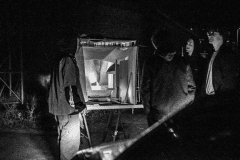No clever quips or anecdotes here, just a number of new releases to stir things up. While I sit here and listen to the Existential Reckoning, I’m not inclined to bother with writing much about the new Puscifer (Maynard James Keenan, Mat Mitchell, and Carina Round) outing. I can take it or leave it. But MOTÖRHEAD just released an Ace of Spades Box Set (BMG) and this is what my day will be full of, listening to Lemmy scream and shout.
But that’s not all we’re offering up. There’s the latest offering from War On Women, Wonderful Hell (Bridge Nine Records). If anything can be said about the Baltimore quintet is that they literally take no prisoners and get right to business as soon as the first notes hit. War On Women has always been direct in its political approach with its music and there’s no slow down on the band’s new release. The group’s punchy deliveries never disappoint with standout cuts like “White Lies,” where the group’s dual guitar delivery leaves listeners wanting more of the same as they take a direct stab at racism and calling out those that are complicit. The title track is alluring, as feedback builds and explodes into a raucous number but it’s “Her?” that I’m entranced by Shawna Potter’s powerful vocal delivery. War On Women is hardcore punk not only for those with fanaticism for it but for those that want something much more fulfilling.
Cincinnati, Ohio’s own Eugenius has quietly been making his mark. The lyricist has been releasing music since 2012 and has compiled a healthy catalog of material. The newest, Midlife, allows the artist to wrap thoughtful lyricism around an experimental hodgepodge of sound. Whether he’s wrapping his words over off-kilter, watery beats (“Savior Self”), or sharing a delivery reminiscent of Rockwell (“Killing Time”) with eerie effect, we can all understand, Eugenius isn’t your average emcee. His art rap sometimes creeps around darkness; quiet storms with only lightning-like words being the only electromagnetic radiation to light our path (“The Architect”). Things go off the deep though, which is refreshing to hear Eugenius taking chances (“Don’t Care”) as his rhymes flawlessly run concurrently alongside horns, deep beats, and thick basslines. There’s more insanity along the way (“fucked”) with drum machine patterns that are purposeful in its obvious inclusion. Midlife is a strange and fantastic ride that’s artistic and bizarrely inviting. 19 tracks that feature other notable Cincy rappers & musicians like Evolve, Grrxrrg, Abiyah, Haskell, Ziprhed, Robert Imhuman, David Armacost, Umin and Sarah Dactyl. I can’t help but play some tracks (“nothing”) over and over again.
In an attempt to dissect an artist’s work, one must show a level of, um, consistency. Attempts are sometimes futile when there’s a lack of similarity within an artist’s work that spans an array of genres and can’t be pinned down as a singularity of sound. What the hell is my point here?
Well, Tom Fec, better known by his stage name of TOBACCO, is reluctant to stay in one lane, opting for something much broader. Fec also fronts Black Moth Super Rainbow, an experimental electronic group out of Pittsburgh, and in 2019 also released an album with prolific lyricist Aesop Rock as Malibu Ken. His work doesn’t simply end there. He’s also worked as a producer with artists like Anti-pop Consortium’s Beans, The Hood Internet, and one of my favorites, The Stargazer Lillies. But this ain’t a history lesson, it’s actually about his latest release, Hot, Wet & Sassy (Ghostly International), which does in fact push the envelope even further.
TOBACCO is an artist that delves into experimentation through electronics and here it’s obvious. Occasionally I’ll get a feel for 80s rumination and at other times there are moments when I’m left wondering if the influence of working with others has rubbed off. But then again, there are moments when the blend of both seem to come into play. This is far from a complaint because it works in TOBACCO’s favor. Ok, let me take it back a bit because I’m probably getting ahead of myself.
Hot, Wet & Sassy opens with the dance-infection of “Centaur Skin,” at moments leaving open space on top of the steady rhythm but as soon as the keyboards and altered vocals chime in, yeah we’re all hitting the dance floor (Me living vicariously through the music, I can imagine myself on the dancefloor, swaying from side to side, slightly inebriated with hand on forehead. Of course, because you know, I’m dope AF). TOBACCO collaborates here on “Babysitter” with NIN man Trent Reznor and it’s pretty obvious it’s left a mark on him. Not so much with this track but more so on tracks “Pit,” “Headless To Headless,” and “Chinese Aquarius.” The short bursts of guitar rhythms tugs at those similarities, not that it’s necessarily a bad thing, the staunch NIN fan that I am anyway. But fortunately, TOBACCO never relinquishes his own identity here and songs like “Motherfuckers 64” and “Ass To Truth” are testaments to it. The former works through an unrelenting rhythm, with altered vocals, and pretty keyboard notes juxtaposed within. The latter is sweet, led along by a drum machine pattern but it’s everything else that’s inviting. TOBACCO’s vocals, keyboard washes, and notes, they fill in the blanks just right.
Listening to the album is exciting and TOBACCO comes through here. Of course, the naysayers may disagree but they probably have no real clue as to who the artist really is. Listening to “Jinmenken” it’s obvious, to me at least, TOBACCO is going against the grain. If that’s not 2020, I don’t know what is.
Facebook | Twitter | Instagram
My nature is to question everything but in my attempts to do so, is it fair to question something I don’t understand? Given, I’m not referring to music because it’s mathematical and we all know math is universal. No, what I’m referring to is language. I’m not the highest grade of weed in the dispensary, the most eloquent, or even the most knowledgeable but when I’m unable to comprehend something I feel…dense.
Trouble Fête (Batakari) is the unison of Belgian-African rapper/lyricist Badi & Boddhi Satva, a pioneering Afro-House producer and the inventor of what’s been dubbed Ancestral Soul. The cross-pollination of genres in dance culture has seen its share of amalgamations and this here is another that breaks boundaries although there is a language barrier. Badi sings and raps in French but that shouldn’t be an issue because as I mentioned previously, music like math is universal. The opening “ Mauvaise Ambiance” thumps with a reggae dubstep which brings to mind Chicago’s MC Zulu in musicality, not in vocal delivery or cadence. But here it’s about that deep bounce and Badi’s in your face delivery. While there is much lost in translation, the music is unmistakably majestic and thumps with passion and directness. They follow the song with “Kitendi” – meaning “clothing” in Lingala, the language of the Congo, Badi’s native tongue – which takes a step back but is just as powerful. The music moves at a relaxed pace and Badi wraps his words around it and the notes that are in play.
“Virgil Abloh” comes in heavy with keyboard lines that builds around the beat where Badi shouts out Virgil Abloh, the Louis Vuitton designer, DJ, architect, who wears many hats, and may possibly be referencing him as a king as “Zulu Chaka,” “T’Challa,” and “Wakanda” are mentioned. The track hits hard and barely leaves any room to take a breath, but it’s ok. We don’t need to breathe, just dance. Which leads directly into a more House/dance-oriented “Intègration” which holds that early 90s bounce of Chicago DJs. And then “Qui Es Tu?” (who are you) drops hard lyrically and musically. Additional vocals are added and harmonies abound. Badi does chime in about Black Lives Matter and always matter. We should realize the revolution is being televised and the broadcast signal is strong. The African culture for these two artists is undeniably thrown into the mix and is just as strong.
African folk music is blended in as well, and listening to “Visa (Bonus 2),” “Visa (Bonus),” and of course, “Visa (Part 2)” it becomes obvious. There are obviously multiple sides to Badi & Boddhi Satva but I think we’re all the better for it as they cross cultural grounds. In the end, the musicality of Trouble Fête is what we’re all here to listen to. Here they haven’t given us what we want, they’ve put together an album of what this world needs.
Facebook | Twitter | Instagram
I could probably breeze through quickly with some releases, which isn’t always the fault of an artist that arrives in my inbox. Finding myself inundated more and more every other day, I sometimes miss something.
We’ve been following the single releases of Rich Jones & Montana Macks the past couple of months, and it would have been a shame to miss out on How Do You Sleep At Night? to witness if there’s something in the duo’s full-length release that actually intriguing. Jones has been releasing singles and E.P.s since 2016 but it looks as if this is his debut album, and he’s partnered up with Macks in the process for it. He and Macks have built a friendship on the foundation of Hip-Hop dating back 20 years. Jones grabs the mic and Macks is the beatmaker and it seems these two Chicago heads have tapped into something here.
How Do You Sleep At Night? is a chill endeavor that cruises down from track to track with melodic vibes, as if they have the syringe in my arm to make my head nod. It isn’t an easy task to be able to generate a feel from one track to the next but Montana Macks hits it right every time. That’s not to minimize Rich Jones’ contribution to the mix. Although the opening “Clicksonmyphone” did fall into late 90s trappings with the first verse, I did then I realized his deliver just makes it seem that way. It’s forgiving with the vocals he sings which breaks up the almost monotone vocal delivery. But throughout the album, that’s my only complaint. He trades verses with fellow Chicagoan Mykele Deville on “Groceries” where as much as we try to live in normalcy, 2020 is in full effect with masks, police harassment, and seeing the beauty around. But I’m drawn to “Shifts” as the music drifts while Jones gets nostalgic here and draws on a multitude of imagery, reflecting. The singing, the rapping; it all gels together well here.
The title track keeps things going with that same flow and the beat though, it’s masterfully raging! Horns trickle in and out while Jones’ delivery isn’t forceful and right on point. One thing about Jones is he’s witty. On “Smokey Mirror” he waxes “Don’t bring an umbrella to a gunfight, it ends poorly / unless it’s Batman 2 and your shit ain’t bulletproof / prepare accordingly…” which of course, force my attention. Yes, this is that prose that gets a bit more abstract but is easily digestible. He brings some more friends along on “Locals Only.” Some like Matt Muse and Psalm One I’m familiar with (Muse’s Nappy Talk was dope and Psalm’s …Frequent Flyer was hot). There are those like Jovan Landry, Skech185, and Defcee that I don’t know well. On the track though, they all kill the beat. It’s obviously a local affair with only Chicago’s own.
The year has forced many into self-isolation and quarantine but for Rich Jones & Montana Macks, their efforts with How Do You Sleep At Night? Hasn’t gone unnoticed. This is that sleek shit that the two seemed to be able to complete with little to no distraction. It shows from beginning to end.








Social Media